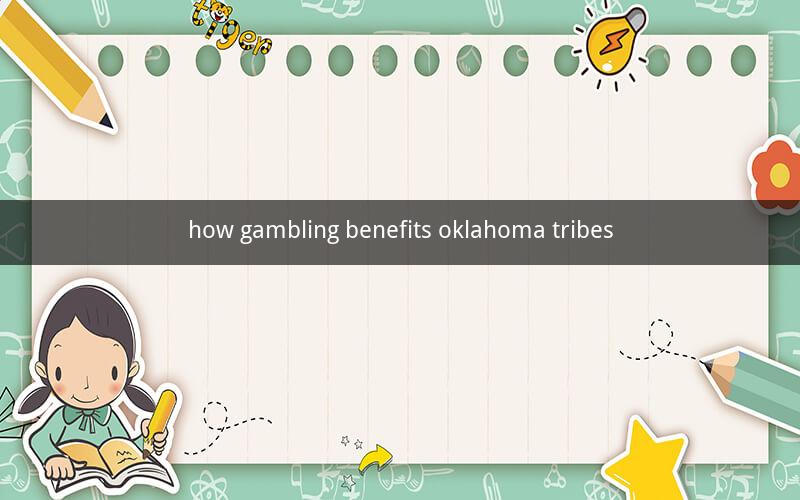
Contents
1. Economic Boost
2. Job Creation
3. Revenue Sharing with State
4. Infrastructure Development
5. Education and Healthcare Improvement
6. Cultural Revitalization
7. Tourism Growth
8. Community Engagement
9. Legal Framework and Regulation
10. Challenges and Solutions
1. Economic Boost
The introduction of gambling enterprises among Oklahoma tribes has significantly bolstered the state's economy. These tribes operate a variety of gambling establishments, including casinos, racetracks, and bingo halls. The revenue generated from these businesses has provided a substantial financial injection into the local and state economies.
2. Job Creation
One of the most immediate benefits of tribal gambling is the creation of jobs. These establishments require a diverse workforce, including hospitality staff, gaming floor personnel, and support staff. The employment opportunities have been especially beneficial for tribal members, many of whom previously faced high unemployment rates.
3. Revenue Sharing with State
Oklahoma tribes often enter into compacts with the state, which outline the terms of revenue sharing. A percentage of the gambling proceeds is returned to the state, which can then be used for public services, infrastructure improvements, and other community needs.
4. Infrastructure Development
The funds generated from tribal gambling have been instrumental in the development of infrastructure within tribal communities. This includes improvements to roads, utilities, and other public services, which enhance the quality of life for both tribal members and non-members.
5. Education and Healthcare Improvement
Revenue from gambling has also been allocated to improve educational and healthcare services. Tribes have invested in new schools, upgraded facilities, and provided scholarships for tribal students. Additionally, healthcare services have been expanded, including the construction of new clinics and the enhancement of existing services.
6. Cultural Revitalization
Gambling revenue has supported cultural programs and initiatives aimed at preserving and promoting tribal heritage. This includes the restoration of historical sites, the support of traditional arts and crafts, and the funding of cultural events that celebrate tribal traditions.
7. Tourism Growth
The introduction of tribal gambling has drawn tourists from across the country, contributing to the growth of Oklahoma's tourism industry. These visitors spend money on lodging, dining, and attractions, further boosting the state's economy.
8. Community Engagement
Gambling operations have encouraged community engagement and participation. Many tribes have established committees and boards to oversee the use of gambling proceeds, ensuring that the benefits are distributed equitably and according to the needs of the community.
9. Legal Framework and Regulation
To manage the growth and impact of tribal gambling, Oklahoma has developed a legal framework that regulates these operations. This includes the Oklahoma Indian Gaming Act, which sets the rules for gambling activities and ensures that they are conducted responsibly.
10. Challenges and Solutions
Despite the benefits, tribal gambling is not without its challenges. Issues such as problem gambling, traffic congestion, and increased competition from non-tribal casinos can pose significant hurdles. Tribes and state officials have implemented various solutions, including public awareness campaigns, traffic management plans, and increased regulatory oversight.
Questions and Answers
1. Question: How does tribal gambling contribute to the economy of Oklahoma?
Answer: Tribal gambling provides a significant financial boost to the state and local economies, creating jobs, generating revenue, and improving infrastructure.
2. Question: What types of jobs are created by tribal gambling?
Answer: A wide range of jobs are created, including hospitality, gaming floor personnel, and support staff, offering employment opportunities for tribal members and others.
3. Question: How do tribes share revenue with the state?
Answer: Revenue sharing agreements are outlined in compacts between tribes and the state, with a portion of the gambling proceeds returned to the state for public services.
4. Question: How has tribal gambling affected infrastructure in Oklahoma?
Answer: The funds have been used to improve roads, utilities, and public services, enhancing the quality of life for tribal and non-tribal communities.
5. Question: What role does tribal gambling play in education and healthcare?
Answer: Revenue is allocated to improve educational and healthcare services, including new schools, upgraded facilities, and expanded healthcare services.
6. Question: How does tribal gambling support cultural preservation?
Answer: Funds are used for cultural programs, the restoration of historical sites, and the support of traditional arts and crafts, promoting tribal heritage.
7. Question: How has tribal gambling contributed to tourism in Oklahoma?
Answer: The introduction of gambling has drawn tourists, boosting the state's tourism industry and increasing spending on lodging, dining, and attractions.
8. Question: What is the role of community engagement in tribal gambling?
Answer: Tribes encourage community involvement through committees and boards that oversee the distribution of gambling proceeds.
9. Question: What legal framework governs tribal gambling in Oklahoma?
Answer: The Oklahoma Indian Gaming Act sets the rules for gambling activities and ensures responsible conduct.
10. Question: What challenges do tribes face with tribal gambling, and how are they addressed?
Answer: Challenges include problem gambling, traffic congestion, and increased competition. Solutions include public awareness campaigns, traffic management plans, and increased regulatory oversight.